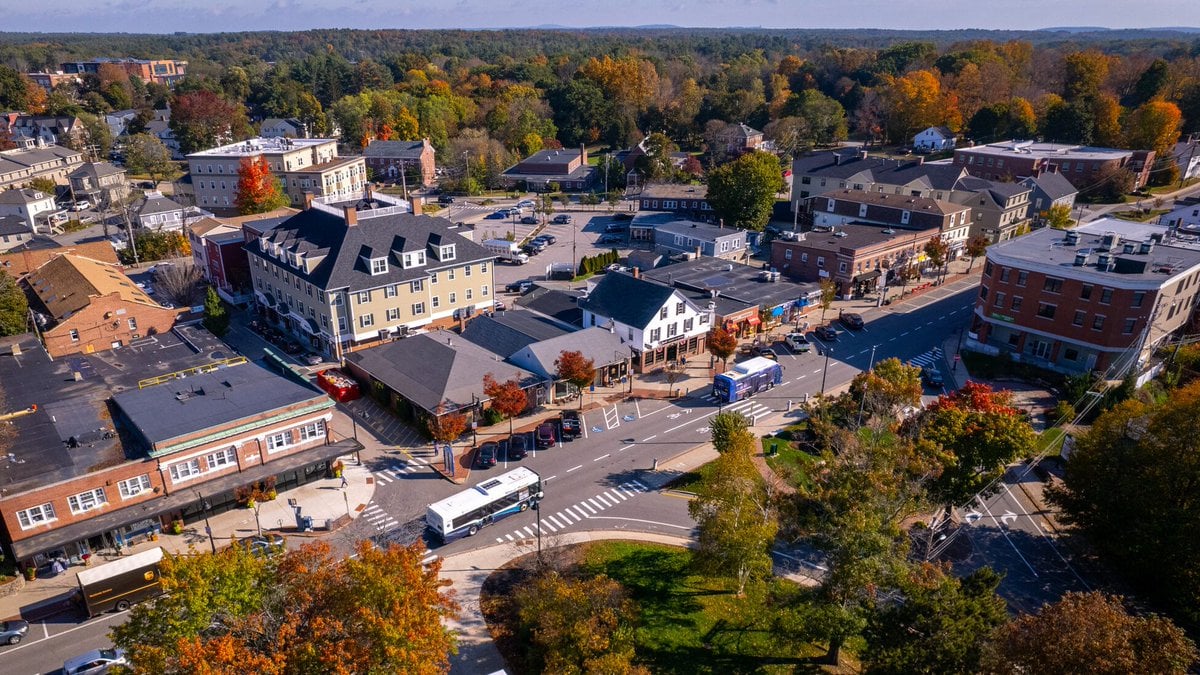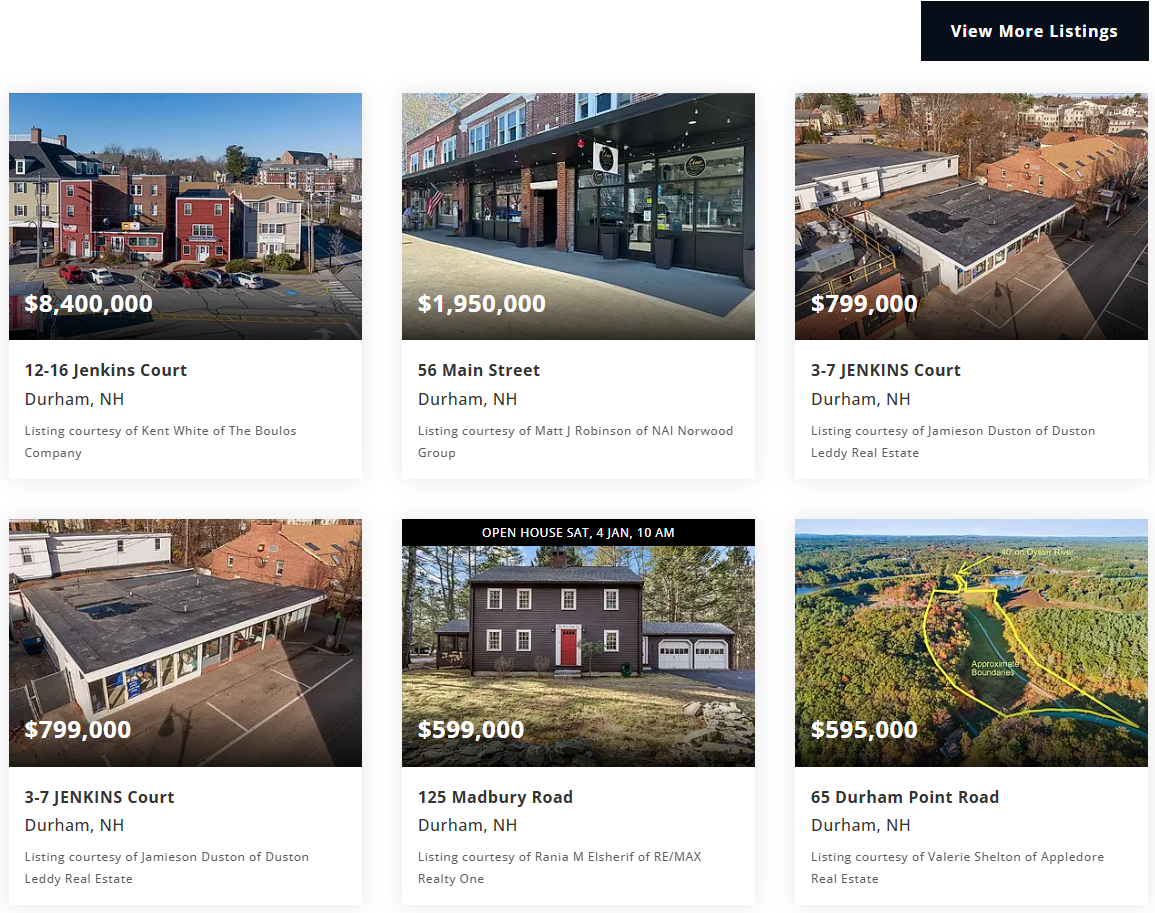When it comes to real estate investment in New Hampshire, Durham stands out as an attractive market. Whether you’re looking to invest in rental properties, short-term vacation rentals, or long-term holdings, Durham offers a combination of strong demand, economic stability, and growth potential. Here’s why Durham should be on your radar as a top investment location.
Durham is a town in Strafford County, on the Oyster River just southwest of Dover. Settled in 1635, it was known as the parish of Oyster River until it was incorporated in 1732 and named for Durham, England. The town offers a welcoming community of approximately 16,000 full-time residents, with about 63% being homeowners. It has a well-established population, with an average age of 36.5 and families spanning all age groups. While Durham maintains a relaxed atmosphere during the week, weekends and holidays bring a lively energy to the area. In recent months, around 158 homes have been sold, with an average sale price of $670,584—an increase of $53,505 from the previous period.
Strong Rental Market, Economic Stability & Growth
Durham is home to the University of New Hampshire (UNH), one of the state’s largest universities. With over 15,000 students from all 50 states and 43 countries — 47% of whom are from New Hampshire — the town experiences a constant demand for housing. This steady influx of students, faculty, and staff makes Durham a prime location for real estate investors seeking reliable rental income. Properties near college campuses offer a unique opportunity for strong rental yields, consistent occupancy rates, and long-term appreciation, making them a smart addition to any investment portfolio.
Beyond its thriving rental market, Durham also offers a stable job market with major employers spanning education, healthcare, and public services. As of 2025, some of the largest employers in the area include:
1. UNH (University of New Hampshire)
Business Description: Schools-Universities & Colleges Academic
Details: With the total average employee size of 4,000 +, UNH is the largest employer in Durham. UNH employs thousands of faculty, staff, and administrative personnel. The university significantly drives the local economy, with a broad range of employment opportunities in teaching, research, administration, and support services.
2. Durham Town Offices
Business Description: City Government-Executive Offices
Details: The local government, including municipal services such as police, fire, and public works, is a significant employer in Durham. These roles are essential to the functioning of the town and contribute to the overall employment landscape. The Town of Durham employs approximately 200 full time positions.
3. UNH Health Services
Business Description: Physicians & Surgeons
Details: As part of the University of New Hampshire, this health service provides healthcare to students, faculty, and staff, and employs a range of healthcare professionals, including doctors, nurses, and administrative staff. UNH Health Services employs about 60 full-time employees.
4. Hospitality and Retail Businesses
Business Description: Hospitality and Retail
Details: Various hotels, restaurants, and retail businesses in Durham and the surrounding area provide employment opportunities, particularly those that cater to the university community and visitors. There are many restaurants in the downtown area which employ 100’s of full and part-timers.
Data Source: nhes.nh
Average Population and Salary
Analyzing Durham’s population trends can be challenging since the University of New Hampshire’s student population is included in the census data. Over the past six years, Durham has seen a gradual population decline, though the numbers have remained steady over the last two years. A key factor in the earlier decline was likely the impact of COVID-19, as many students opted for online learning and did not reside in town. However, pinpointing the exact cause is difficult.
As of 2024, Durham’s population stands at 14,919. The town is experiencing a slight annual decline of -0.01% and has seen a -4.08% decrease since the 2020 census, which recorded a population of 15,554.
What is the average salary in Durham?
As of January 2025, the average annual salary in Durham is $48,806. This equates to approximately $23.46 per hour, $938 per week, or $4,067 per month. Salaries in the area typically range from $36,424 (25th percentile) to $58,575 (75th percentile) per year.
Of course, earnings vary based on occupation, experience, and other factors. Some of the highest-paying fields in Durham include engineering, part-time specialist roles, and sales.
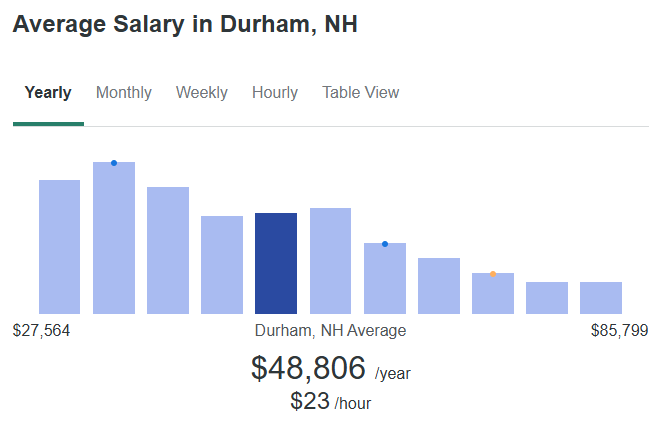
Source: ZipRecruiter
High Quality of Life
Durham is known for its excellent public schools, low crime rates, and beautiful natural surroundings. It is an attractive place for families, professionals, and retirees, adding to the demand for housing. Properties in Durham appeal not only to students but also to long-term residents who want to take advantage of the town’s high quality of life.
Proximity to Major Cities & Attractions
Durham is conveniently located near major cities and attractions, making it ideal for commuters and visitors alike:
- Portsmouth (20 minutes away) – A vibrant coastal city with a strong job market and a thriving downtown scene.
- Dover (15 minutes away) – A growing city with expanding business opportunities.
- Boston (1 hour away) – Easy access to one of the largest economic hubs in the Northeast.
- Seacoast & Beaches – Durham’s close proximity to New Hampshire’s coastline adds to its appeal for short-term and vacation rentals.
Investor-Friendly Tax Environment
New Hampshire is known for being a tax-friendly state. There is no state income tax or sales tax, which makes investing more profitable compared to other states. While property taxes may be slightly higher, the overall tax burden remains lower than in many other regions, making Durham an attractive option for real estate investors.
LOCAL MARKET UPDATE as of JANUARY 2025
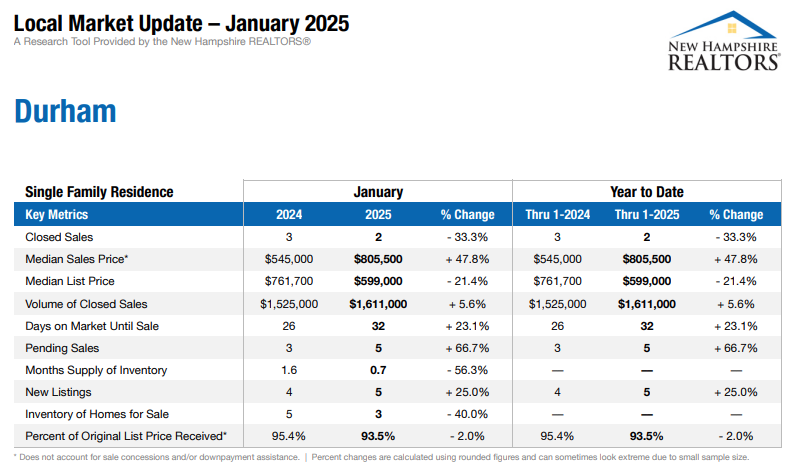
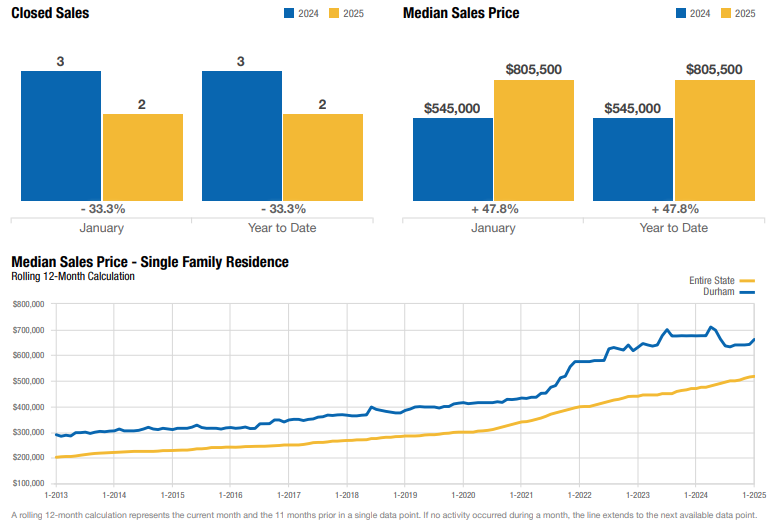
Analysis & Summary:
- Closed Sales Decline (-33.3%)
- January 2025 saw only 2 closed sales, compared to 3 in January 2024.
- The same trend applies to Year-to-Date (YTD) figures.
- This decline may indicate lower buyer activity or limited inventory.
- Surging Median Sales Price (+47.8%)
- The median sales price jumped significantly from $545,000 in 2024 to $805,500 in 2025.
- This suggests that one of those closed homes was very expensive, pulling up the median price.
- Higher Volume of Closed Sales (+5.6%)
- Despite fewer sales, the total dollar volume of sales increased slightly from $1.525M to $1.611M.
- This reinforces that the price per home has gone up.
- Longer Days on Market (+23.1%)
- Homes are taking longer to sell, increasing from 26 to 32 days.
- This could indicate buyer hesitation due to rising prices or fewer competitive offers.
- Reduced Inventory and Supply (-56.3%)
- The months supply of inventory dropped from 1.6 to 0.7 months, showing tight supply.
- The total number of homes for sale also decreased by 40% (from 5 to 3 homes).
- This suggests a seller’s market with high demand for limited homes.
- Pending Sales Increase (+66.7%)
- Pending sales increased from 3 to 5, indicating more homes are under contract.
- This could signal a rebound in future closed sales.
- Slight Dip in Listing Price Received (-2.0%)
- Sellers are receiving 93.5% of their asking price, down from 95.4%.
- This may indicate some price negotiations despite the rising prices.
Predictions & Market Outlook:
- Prices May Continue Rising
- The limited inventory and high demand could continue driving up home prices.
- If new listings remain scarce, median prices may stay above $800,000.
- More Sales Likely in Coming Months
- The increase in pending sales suggests that February and March might see higher closings.
- However, the overall number of sales could remain low if inventory doesn’t improve.
- Longer Selling Times Expected
- With rising prices, some buyers may wait or negotiate harder, leading to longer market times.
- Sellers might need to adjust expectations on how quickly homes will sell.
- New Listings Could Balance the Market
- A 25% increase in new listings (from 4 to 5) could help bring more options for buyers.
- If listings grow, prices may stabilize instead of continuing their sharp rise.
Final Thoughts
Durham’s real estate market remains competitive and tilted toward sellers, with low inventory and rising prices. However, longer selling times and price negotiations suggest that buyers are becoming more cautious. If inventory remains low, expect price growth to continue, but if more listings come on the market, the market could balance out in the coming months.
If you’re looking for a market with steady rental demand, property appreciation, and a high quality of life, Durham, NH, is an excellent choice. With its strong economy, proximity to major hubs, and tax-friendly environment, investing in Durham can provide long-term profitability and stability. Whether you’re considering student rentals, short-term vacation properties, or long-term holdings, Durham offers opportunities for various types of investors.
Are you ready to explore investment opportunities in Durham? Let 10X Real Estate help you find the right property to maximize your returns. Contact us today to get started!
Here are the listings of available properties in Durham. Click the picture below to show all listings.
Want to see more featured areas in New Hampshire? Click here to explore featured areas.

